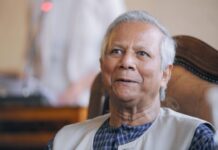
Prime minister Sheikh Hasina speaks in parliament during the prime minister’s question hour on Wednesday.
Prime minister Sheikh Hasina on Wednesday said Bangladesh would not allow ‘waves’ of Myanmar citizens fleeing military atrocities to sneak into the country. ‘People who had lost everything are coming to Bangladesh. We are providing shelter, food and medicine to them on humanitarian ground. But we can’t allow waves of them by opening our frontiers as we are an independent and sovereign country,’ Sheikh Hasina said at the parliament. Hasina made the comments when over 21,000 Rohingya Muslims who are fleeing military crackdown on the religious minority community in Rakhine state in Myanmar had trespassed into Bangladesh in last three weeks. In the meantime, Bangladesh had pushed backed several thousands of fleeing Rohingyas and hundreds were sneaking into the country to save their life floating on the Naf river. Myanmar’s military and the government have rejected allegations by residents and rights groups that soldiers have raped Rohingya women, burned houses and killed civilians during the military operation in Rakhine. Hasina said that Bangladesh after summoning the Myanmar envoy in Dhaka already had asked the Myanmar government to take appropriate steps so that their people do not have to enter Bangladesh. The current spell of problem ensued in Myanmar when criminals attacks on border posts of the country left policemen killed. Thousands of women and children who were not part of the attackers are suffering the aftermath of the attack, said Hasina, while answering a supplementary question from lawmaker Fakhrul Imam during the PM’s question-answer session Hasina said that she had asked Bangladesh border guard and intelligence to keep an eye on whether the attackers of Myanmar border outposts had come to Bangladesh and ordered their arrest. ‘We would hand over the criminals to Myanmar. We would not allow anyone to use soil of Bangladesh to destabilise any neighboring country,’ she said. Hasina also lambasted campaigners who were protesting the draft child marriage bill terming them ‘unrealistic’. She said that the new draft law [Child Marriage Prevention Bill 2016] had provision of allowing marriage of girls below the age of 18 in ‘special circumstances, such as accidental or unlawful pregnancy based on court approval’ and on the ground realities. ‘If 12-14 years old girls become pregnant and do not abort it, what will be the future of the children and teen age mother? Our society does not accept them, even schools do not enroll children without identity of father and mother,’ Hasina said. ‘As the prime minister I do have responsibility to create a position for such children, and for that I have kept the special clause allowing marriage of girls under 18 years with court approval following appeals from parents,’ she added. Hasina said people who were making money through NGO business were protesting. They do not or have very little responsibility toward nation. Some people and organisations are talking about the matter who have no experience of living in the rural areas for 2-4 years, she said. ‘They don’t understand ground realities,’ Hasina added. Bangladeshi and international campaigners had been protesting the draft bill approved by the cabinet on November 30, saying that the draft legislation posed grave risks to girls by creating vague exceptions. ‘There is nothing to be worried about child marriage. We are making the law keeping in mind family and social condition of Bangladesh,’ Hasina said. ‘People who are asking questions about special clause, are unrealistic. A law cannot be rigid, it should contain the provision for what is to be done when special problem arises,’ she said. She said that England, USA and many countries had marriage age of 14 or 16. ‘Big number of teenage mothers are there in these countries… is that a big problem for them’? New York-based International rights group Human Rights Watch urged Bangladeshi parliamentarians not to pass the proposed law putting girls at greater risk of child marriage. It said that Bangladesh has one of the highest rates of child marriage in the world, and the highest rate in Asia. Fifty-two per cent of girls in Bangladesh marry before age 18, and 18 per cent are married before they turn 15.
Source: New Age









